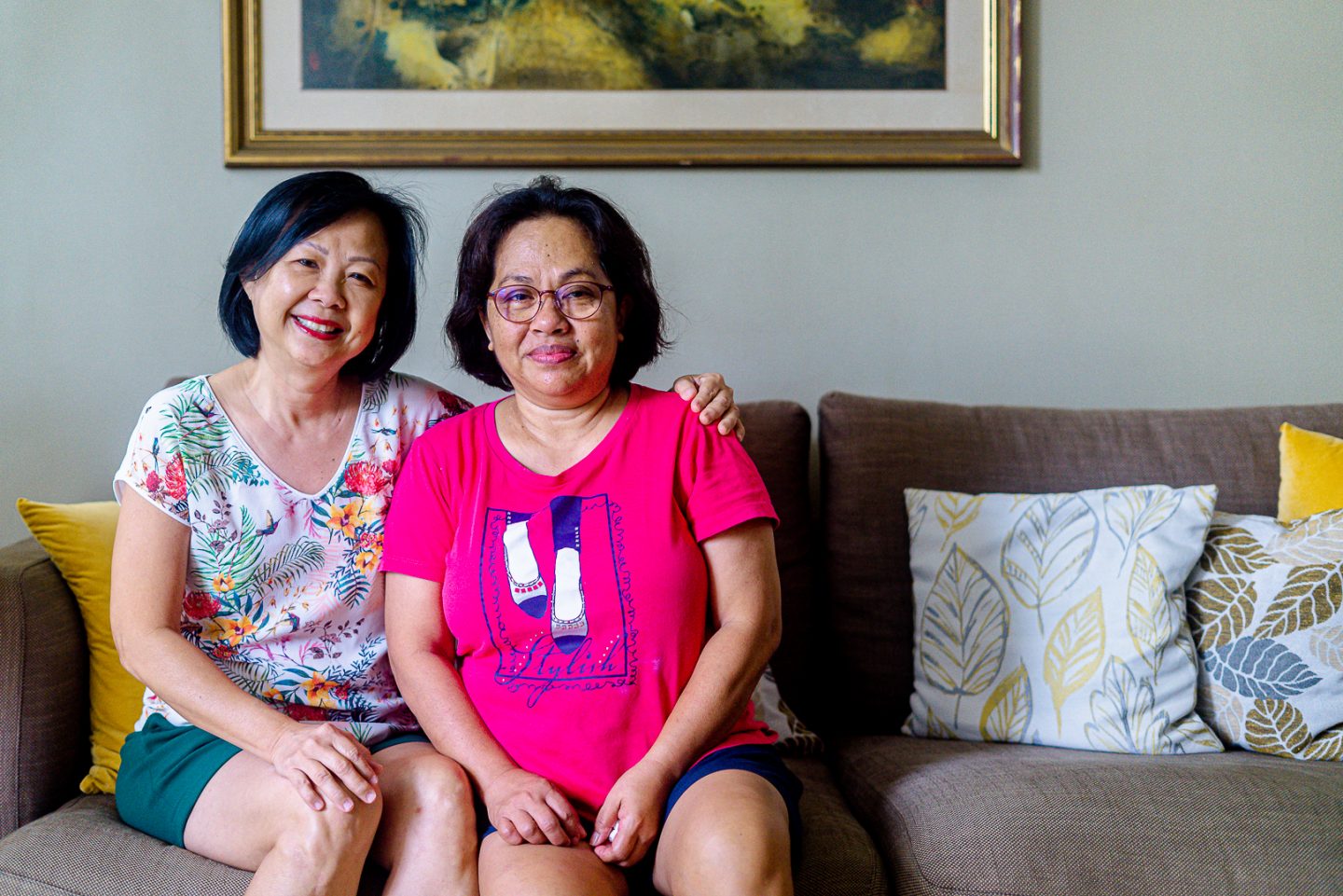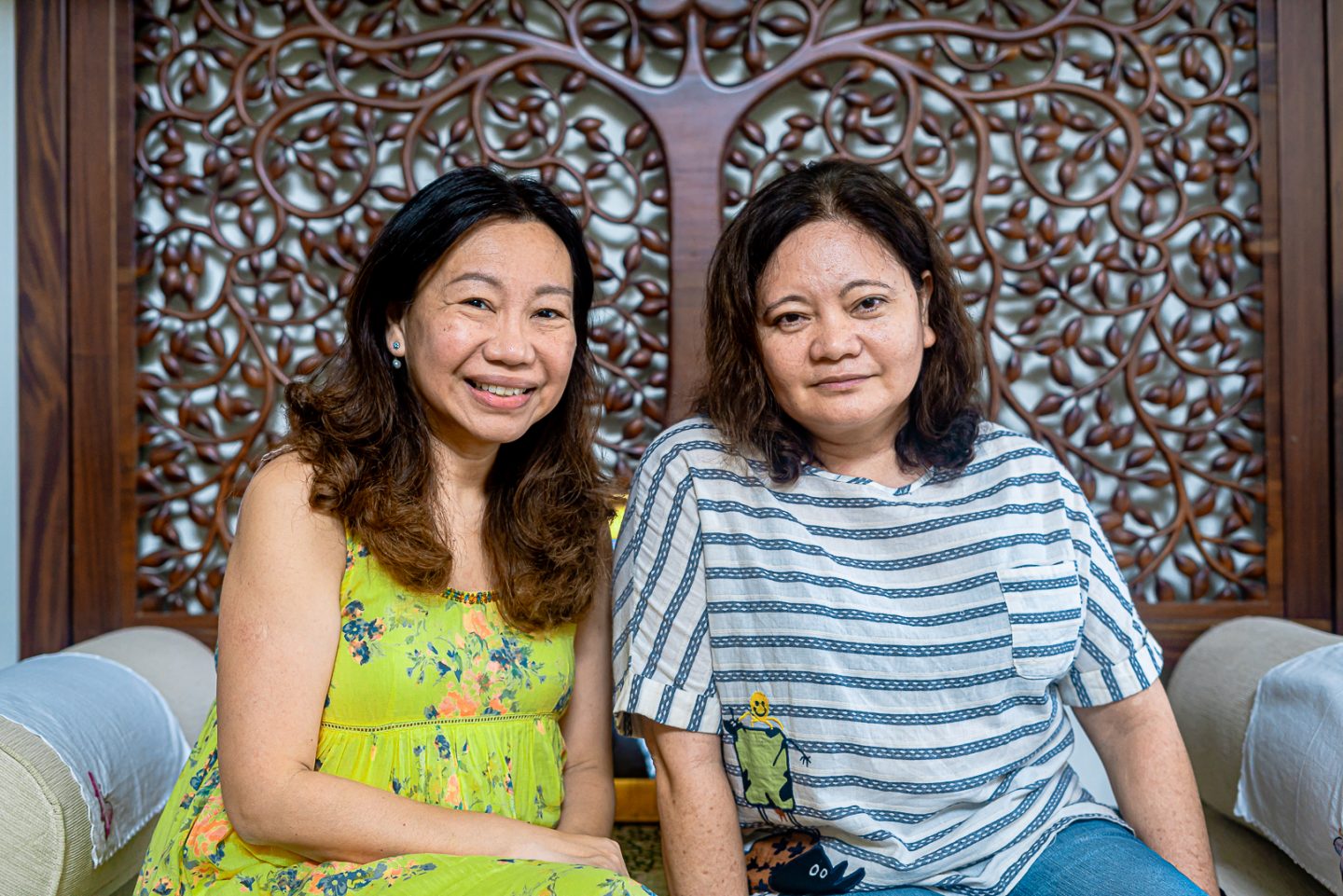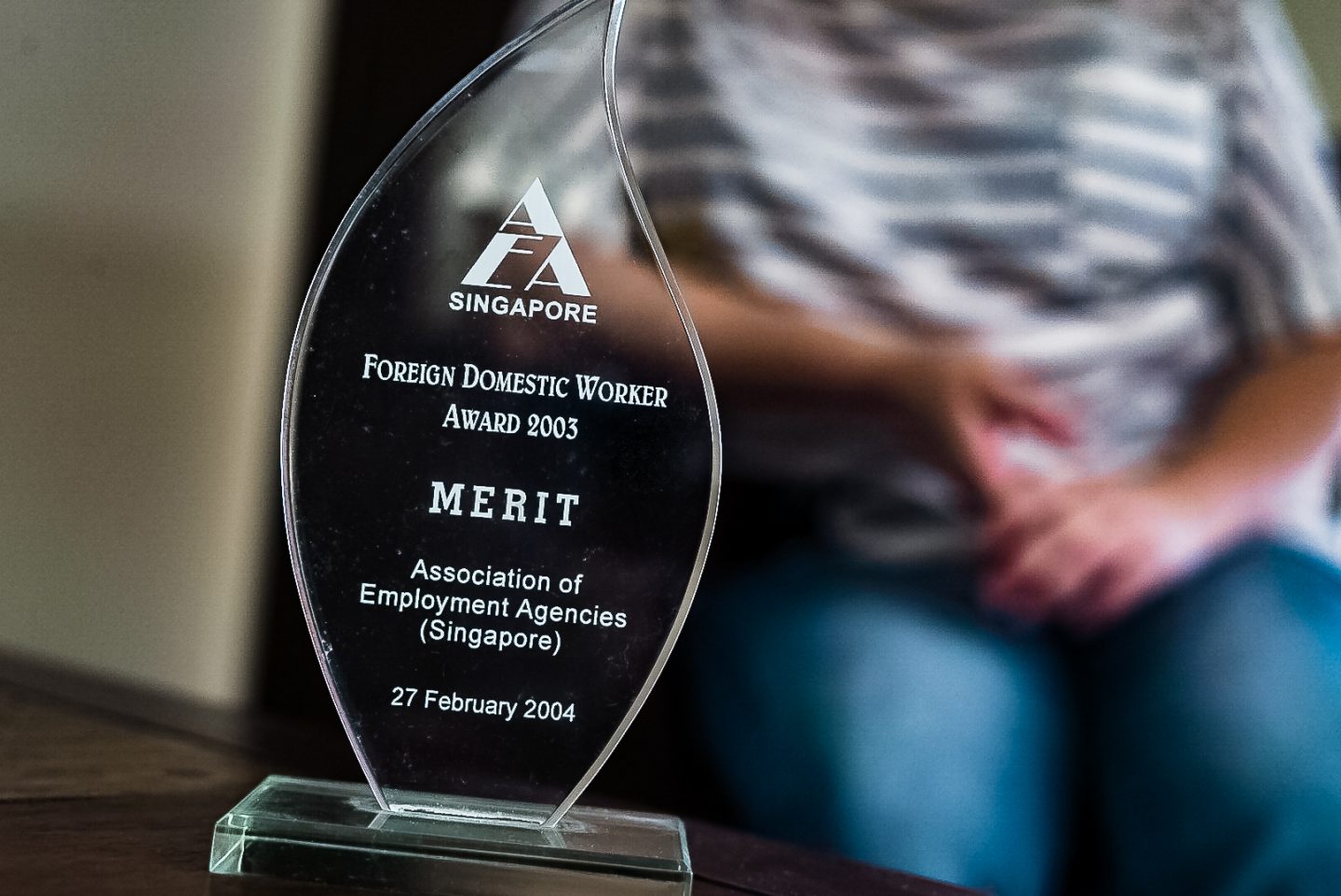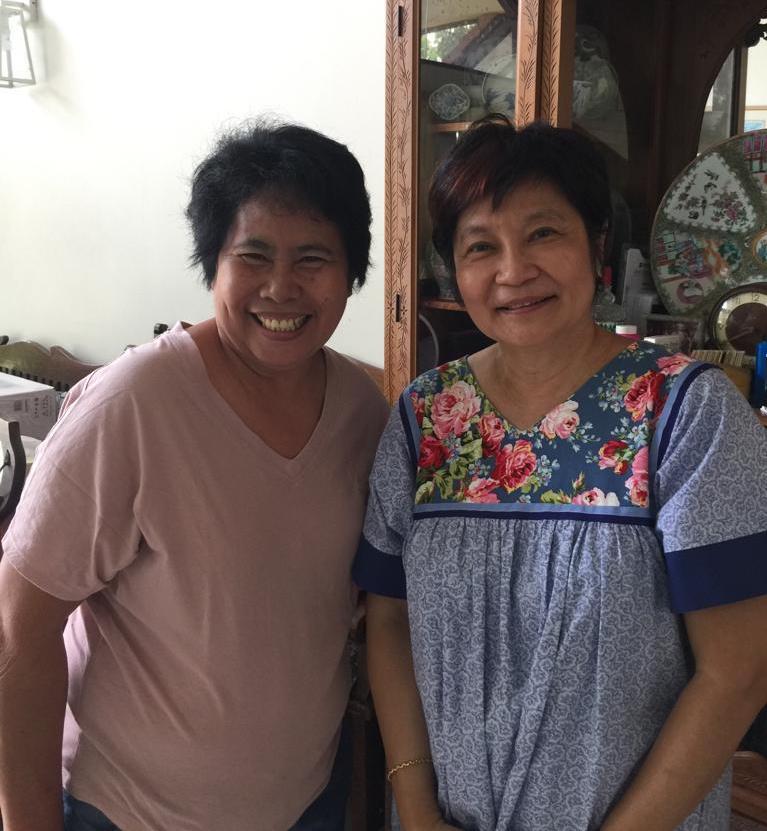“Whatever the law states, we must do better”: Employers who cook for their sick helpers and pay for husband’s airfare because “love begets love”
by Rachel Phua // August 30, 2019, 6:54 pm

A pivotal moment in Cyril Tito's (right) faith was when she saw her employer of 31 years, Siong-Lye Puat Fong (left) and her family, take extra care of her as she was recovering from breast cancer. Photo by Rachel Phua.
When Cyril Tito fell ill with breast cancer in 2013, instead of shooing her back to the Philippines, Siong-Lye Puat Fong asked her to stay put in Singapore, where she believed Tito would receive better medical treatment and the cost would be covered by insurance.
Tito is a domestic helper, and Siong-Lye her employer.
Tito, 59, remembers a day or so after she came home following her mastectomy, a tube still attached to her body, Mum Puat – as she affectionately calls Siong-Lye – directed her to sit in front of the sink and started washing her hair.
“Why are you doing this? You don’t need to do this lah,” Tito remembers insisting. “Who am I? I’m just a helper, my boss is doing this for me?” Siong-Lye, sitting behind her on the sofa, is dabbing her eyes with a piece of tissue paper. She grabs one more for Tito, who has also started to tear.

Lee Muiling (left), who hired Ellen Aspira (right) 24 years ago, has a motto she goes by: “We always believe in ABCD: Above and beyond our call and duty.” Photo by Rachel Phua.
In Tito’s own words, they treated her “like a queen” before her sister came over to look after her. She would wake up to a text in the morning telling her that breakfast and lunch were ready. Siong-Lye’s son and daughter would always check in on her, cups of water in hand.
It was the first time after she became a Christian that Tito genuinely understood what divine love meant, she said. She had often heard the phrases “God’s love” and “God loves you” in messages and at church. “This time, He really put His love in Mum Puat and used her to let me experience it,” she explained.
Part of the family
Tito is one of more than 250,000 foreign domestic workers employed by families in Singapore to help with chores or caregiving duties, making up about 7% of the nation’s labour force, according to the Ministry of Manpower.
Domestic helpers are now very much a part of the 21st century household but stories of exploitation and abuse highlight the sometimes fraught relationship between employer and maid. Against this backdrop, some Christian employers are making the effort to treat the helpers as one of their own.
“There’s nothing I won’t trust her with.”
For Siong-Lye, 65, accepting Tito as part of the family came naturally. She had hired the Filipino in 1988 primarily to take care of their first child as she and her husband were working. Tito arrived exactly on the day her daughter was born.
Having looked after her nieces, Tito was experienced in handling babies and she ended up teaching Siong-Lye how to take care of her daughter. “So I didn’t feel there was anything I couldn’t trust her with,” said the mother of two.
She calls Tito her “partner” – they split the work whether it’s shopping for groceries or doing the chores. At the market, Siong-Lye looks for the fruits, while Tito hunts for the fish and the poultry. Even when it comes to buying household appliances, Siong-Lye consults Tito first, because it becomes “a white elephant” if Tito doesn’t like it.
“They are helpers, not slaves”
To make sure Tito has adequate rest, Siong-Lye has always washed her own car and, now that she’s retired, cleans her own room. It’s a five-storey townhouse after all. When the Siongs were thinking of moving, it was Tito that scanned through the papers and spoke to real estate agents.
“If you treat them as someone with the potential to do a lot of things, they will live up to that.”
“I don’t see her as any different from those working in an office,” said Siong-Lye, who used to be a marketing manager at Energizer Singapore. “The only difference is the type of work they do. They are helpers, not slaves.
“My philosophy is that if you treat them as a maid, they will only live up to that reputation. But if you treat them as someone with the potential to do a lot of things, they will live up to that.”
That is also partly why Lee Muiling, 54, has been registering and paying for her helper to attend recreational workshops now that her children are grown up. By now, Ellen Aspila, 49, has tried out classes in cooking, flower arrangement and terrarium-building.
“We always believe in ABCD: Above and beyond our call and duty. So we believe being the light and salt whatever we do it should glorify God,” said the senior civil servant. Whatever the law states, the Lees say they must do better.
Lee hired Aspila more than 20 years ago to take care of her eldest son. Being a working mum helped her to be more open-minded, though she recalls friends who would still call home every hour or install security cameras to keep track of their helpers – she just wasn’t as particular over Aspila’s whereabouts.

Lee nominated Aspira for a service award back in 2003, which Aspira won. Photo by Rachel Phua.
Lee also made sure Aspila got to travel on holiday. Last year during Chinese New Year, Aspila joined Lee’s oldest son to visit his grandmother in Penang. This year, she went with two of Lee’s kids to Bangkok. Lee, a senior civil servant, paid for all the expenses, and did all the housework in the meantime.
Ministry starts at home
When Christians think of ministry, they often focus on opportunities in church or overseas. Yet, often, ministry can start in one’s backyard.
James Quek, the founder of a faith-based maid agency MyHelper, told Salt&Light previously: “I hope Christian families will see it a ministry. You have your helper in your house, and she is a captive audience for two years. You can do lots for her as a person and her belief.
“Your helper is a captive audience for two years.”
“If Christians see maids as a mission field, I think that will bring a great transformation in the market.”
This was what history teacher Joy Quek, 65, had in mind when she hired her first helper in 1988.
In the 1980s, Joy said, having a helper required a considerable sum of money. “God had granted us the means to have a maid, so there must be a higher purpose.”
Minutes after Vilma Raquinio stepped into the house, Joy asked if she could pray for her, that God would take care of her husband and children back in the Philippines and she wouldn’t be beleaguered by homesickness.
From new Christian to cell leader
A month or two after she’d settled in, Joy persuaded her to join the Filipino fellowship at St Andrew’s Cathedral, where the family was attending. Raquinio grew to enjoy it, Joy said.
When Raquino’s friends from the fellowship needed space to meet after service, Joy opened up her place. One year, they even paid for Raquino’s husband to come to Singapore so that he could understand what his wife did as well as attend a church service.
Raquino returned to the Philippines after 11 years with Joy’s family, and a friend she met through the fellowship, Rufina Bacos, replaced her in 1999. The gatherings at Joy’s house continued.

Rufina Bacos (left) was so much a part of the family that her church friends immediately went to help out at the wake for Joy Quek’s (right) father.
Joy’s aged parents moved in later on and because they were such “people persons”, they were inevitably part of the party on those occasional Sundays. The women had no qualms calling them ‘Ah Kong’ and ‘Ah Ma’, Joy noted with glee.
When Joy’s father died on Philippines’ Independence Day in June 2005, she remembers, touched, that most of Bacos’ friends from the church came over immediately to help with the wake and pay their respects.
When asked if she wanted to accept Christ, she said yes.
Tito didn’t know Jesus personally when she first arrived in Singapore, but because Siong-Lye’s cell group met at her house, Tito would join in whenever she had time. At one session, they were singing As the Deer Pants for the Water. Unknowingly, she teared up. After the cell meeting, Siong-Lye’s late husband asked her privately if she wanted to accept Christ, and she said yes. It was 1996.
Over the years, she was encouraged by Siong-Lye to attend the Bible Study Fellowship and courses at their church. Today, Tito is now a cell leader at Bartley Christian Church’s Filipino congregation and, as one, she regularly has to run mid-day errands: Take a cell mate to the hospital, bring helpers new to Singapore to the church, or teach a newcomer how to cook at their employer’s home.
“Aiyah, why is she going out again?” Siong-Lye admits sometimes she can’t help but grumble. “But I have to check myself that it is God who says, if you help any one of these, you’re helping Jesus (Matthew 25:40). So that helps to correct my ugly thoughts.”
Love begets love
A few years after Tito’s brush with cancer, it was her turn to return the favour.
Between 2016 and 2017, Siong-Lye’s husband was battling cancer and she was in and out of the hospital most days. Tito became the pillar of support in the family.
“If you help any one of these, you’re helping Jesus.”
She took care of the children, talked to them and consoled them, Siong-Lye said, welling up. She walks over to a cabinet and takes out a photo album filled with photos of Tito and her two children, pulling funny faces. That’s how close they are, she said.
Earlier this year, Siong-Lye found a folder on her late husband’s laptop she had never opened before. In it, she found notes that he had written to each member of the family, including Tito.
He apologised to Tito for all the times he had been finicky about food when he was sick. One moment he said he wanted to eat something. The next, after it had been prepared, he refused to eat it. Her patience didn’t go unnoticed.
She was also part of his will, which was why last year she could purchase land and a house in the Philippines. That house is for the future – and will always be open to the Siongs – but for now, home is where her family is.
We are an independent, non-profit organisation that relies on the generosity of our readers, such as yourself, to continue serving the kingdom. Every dollar donated goes directly back into our editorial coverage.
Would you consider partnering with us in our kingdom work by supporting us financially, either as a one-off donation, or a recurring pledge?
Support Salt&Light


